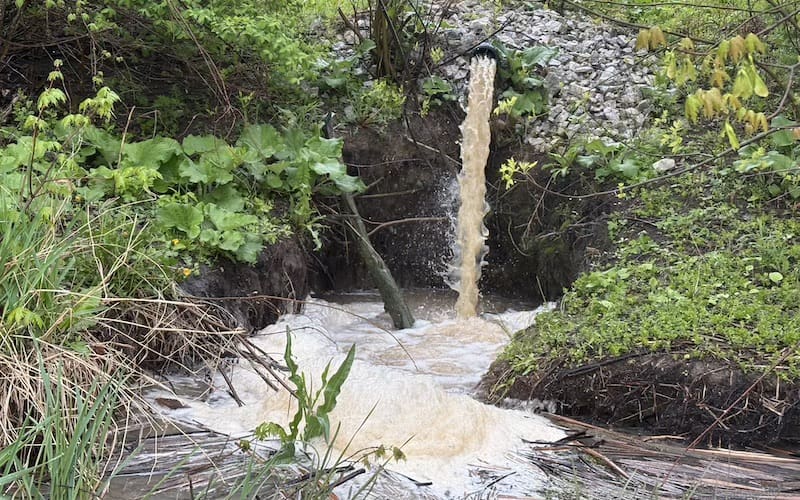
Numerous pipes on the Vorsteveld operation in Panton, Vermont, pour pesticides directly into tributaries of Lake Champlain without a permit. Photo: CLF
October 16, 2025 (Montpelier, VT) – Conservation Law Foundation (CLF) and Vermont Natural Resources Council (VNRC) have notified Vorsteveld, LLP — a large Concentrated Animal Feeding Operation (CAFO) — of their intent to sue for federal Clean Water Act violations. Numerous pipes on the Vorsteveld operation in Panton, Vermont, pour pesticides directly into tributaries of Lake Champlain without a permit. The notice is the first step in CLF and VNRC’s efforts to hold Vorsteveld accountable for pouring toxic chemicals from its operation at levels that far exceed state and federal safety standards, including by as much as fifty times higher.
“Vorsteveld, LLP is breaking federal law,” said Elena Mihaly, CLF’s Vice President for Vermont. “Unregulated pollution poses a grave risk to people, plants, and wildlife in our communities. No one should have to worry that a major agricultural operation next door is poisoning their water.”
Under the federal Clean Water Act, Vorsteveld is barred from dumping any pollutants into Vermont’s waterways without a permit. The suit seeks action requiring Vorsteveld to take responsibility for its toxic pesticide discharges by securing a legally required federal pollution control permit and taking steps to stop its pollution.
“Clean water is a basic human right, and it’s something every Vermonter deserves,” said Lauren Hierl, Executive Director of Vermont Natural Resources Council. “Our state economy heavily depends on the health of our waterways, and no farm should be allowed to pollute at these exceptionally high levels.”
The notice details dangerous levels of multiple pollutants coming from the site, including atrazine, metolachlor, and clothianidin. Out of 92 water samples collected from the Vorsteveld pipes over two years, 99% contained clothianidin at concentrations exceeding the EPA’s safety benchmark. Atrazine, a highly toxic herbicide that was banned in Europe in 2004, was documented at fifty times higher than what the EPA considers safe for drinking water. Atrazine is a hormone-disrupting pesticide that is linked to birth defects, cancers, and other health risks.
“Farmers are core to the fabric of the treasured landscape we call home in Vermont. They’re also vital to our state and regional economies,” said Mihaly. “The agricultural community takes pride in stewardship of the land, and they know pouring toxic pesticides into public waters where we boat, fish, hunt, wildlife watch, and get drinking water from downstream is not the Vermont way. Vorsteveld must take action now to stop this illegal pollution.”
You can read the Notice of Intent here.
Experts are available for further comment.
###
